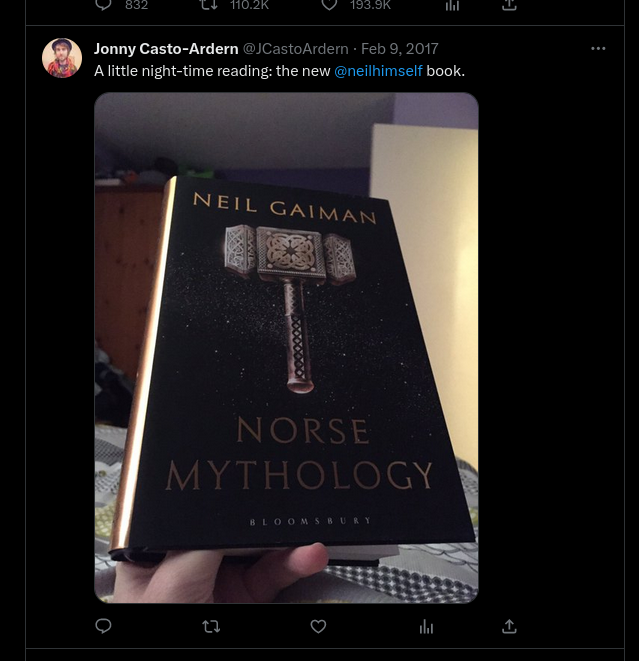Review: Norse Mythology
:date: 2023-07-19 08:23 :tags:
Very famous author and generally cool guy Neil Gaiman wrote a book about and titled Norse Mythology. Neil is mostly famous for writing the original stories behind such popular works as Coraline and the show Good Omens (and many, many more). So the author is not a stuffy academic (like Tolkien) who has to put extra effort into making their writing something one reads for pleasure. I felt like we're really getting the most readable treatment of the material possible.
A lot of modern culture draws on a wide range of old time religions and Europeans had no shortage of wacky beliefs. Perhaps more than "religious beliefs" these myths were also by necessity filling in for what modern fiction (movies, books, games, soap operas, etc) provides today.
(While reading this book I noticed one of my favorite Youtube creators also had read it.)

If you have played Skyrim or read the Hobbit and liked that sort of thing, this book will probably be interesting to you. Those works don't include Norse mythology per se but they're both heavily inspired by many elements from it. I haven't seen the Marvel Thor movies but obviously we're not talking about intellectual property that is dead and forgotten. It seems quite reasonable that someone dredge up the authentic real source material and translate it into something modern readers can understand and enjoy without years of study.
Sometimes I do like doing things the hard way and I've been making a lot of progress learning Norwegian. That was an obvious motivation to check this book out. I was surprised and a bit disappointed by how un-norsk this Norse mythology seemed to me. For example, even being able to read Norwegian pretty well, I still couldn't confidently pronounce any of the weird names in the stories. Normal humans, of course, will not have this problem. I guess it follows the pattern not unknown in English. Consider this wikipedia description: "Other... proposed ... candidates for ... Lancelot include ... saint Fraimbault de Lassay; Maelgwn, king of Gwynedd and Llaennog (Llaenauc), father of Gwallog, king of Elmet...". If those names seem perfectly normal to you, then you are not a normal English speaker. Same for Norse mythology and modern norsk as far as I can tell. I suspect that if you are a Norwegian living in Norway today and you want to get a good introduction to your own historical mythology, this book — in English — is still probably your best bet.
Gaiman's treatment of the material seems pretty light but maybe that's just his easy-to-read prose making me think that. Even if it is academically weak (which it may not be!) I think it has incredible value. If you are an academic Norse mythology scholar, then you must read this book multiple times just to help teach yourself how to properly communicate with normal people. If you are quite knowledgeable about Norse mythology, this is worth reading just for being a rare refreshing presentation of that material that is quite readable. If you know nothing about Norse mythology but are kind of interested, this book is about as easy as it gets to take a next step. If you don't know or care about Norse mythology, this book is about the best chance possible for sparking an interest (no, Marvel does not take that honor).
Thanks to the miracle of modern large language models, I was able to generate a very condensed summary of the whole book just so I could remember roughly what this was even about. It should also provide a hint of the kinds of stories in the book.
1. Odin loses an eye pursuing wisdom.
2. Loki creates a contest among dwarfs to avoid Thor's wrath.
3. Loki has a secret family including Fenrir wolf.
4. Someone tries to marry Freya; she refuses.
5. Mead gives the ability to write poetry.
6. Thor travels to the land of giants.
7. Loki loses the apples of immortality.
8. Frey falls for Gerd and gives up his magic sword.
9. Thor borrows a giant's cauldron by winning a bet.
10. Loki causes the death of Balder.
11. Loki goes into exile after insulting the gods.
12. Ragnarok describes the end of the Norse gods.
I asked my robot pal to enumerate ways that Gaiman's book diverges from typical scholarly treatments of the material and this list pretty much says everything one might need to know.
- Gaiman streamlines and condenses the stories into a more readable narrative, leaving out some scholarly details.
- He emphasizes the humorous and witty aspects of characters like Loki, whereas academics may focus more on rituals/symbols.
- The tone is casual and modernized rather than trying to mimic medieval prose or impart academic analysis.
- Academic analysis would focus more on context, historical linguistics and interpretations.
- Gaiman oriented the stories towards entertainment for a modern fantasy reader.
- The book arranges stories into a complete narrative arc rather than keeping them distinct as academics would.
If you didn't know the book existed, now you do. If you weren't sure if you wanted to read it, hopefully that's been solved now too.